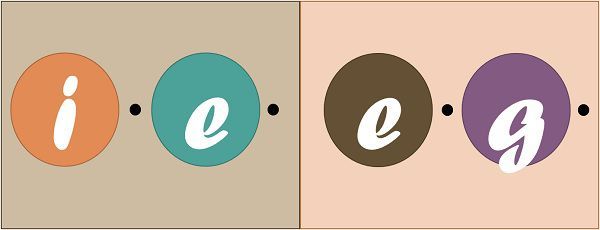 You might have noticed the lowercase letter acronyms i.e. and e.g. while reading newpapers, novels, journals or any other material. While i.e. expands to ‘id est’, which means ‘in other words’, e.g. is a short term for ‘exempli gratia’ which means ‘for example’. Let’s understand these two with an example:
You might have noticed the lowercase letter acronyms i.e. and e.g. while reading newpapers, novels, journals or any other material. While i.e. expands to ‘id est’, which means ‘in other words’, e.g. is a short term for ‘exempli gratia’ which means ‘for example’. Let’s understand these two with an example:
There are two types of games, i.e. indoor games and outdoor games, wherein Indoor games are played inside the home, e.g. chess, carrom etc.
These two commonly used abbreviations in English which have different meaning and usage. However, they are commonly juxtaposed, as they are used to clarify the statement further, in the first case by restating it in a better way and in the second case by giving examples. So, let’s take a look at the article given below to understand the difference between i.e. and e.g.
Content: i.e. Vs e.g.
Comparison Chart
| Basis for Comparison | i.e. | e.g. |
|---|---|---|
| Meaning | i.e. means 'that is' | e.g. means 'for example' |
| Etymology | It is derived from a Latin term 'id est'. | It is derived from a Latin term 'exempli gratia'. |
| Used | To provide further clarification | To provide examples |
| Position | It is given in the middle of the sentence. | It is given at the end of a sentence. |
| Example | Twitter is a social media site, in which the users can read and share short messages, i.e. tweets. | There are many social media sites to connect people, e.g. Facebook, Instagram, Twitter and Google plus. |
Definition of i.e.
i.e. is an acronym for a Latin term ‘id est‘, which in simple term means ‘that is’, ‘in other words’, ‘in essence’ or ‘in effect’. We often us when we explain something further which is just said or written in a different and better way. Hence, it can be a definition, elaboration or a metaphor, to provide additional information in support of the statement or give emphasis to it. Now we’ll understand where we use, i.e. in our sentences:
- It is used before some additional information, to make it easier to understand and express its real meaning:
- School are closed during summers, i.e. from April to June.
- We require qualified teachers for our college, i.e. Ph.D. holders.
Definition of e.g.
e.g. is a shortening for, ‘exempli gratia’ which is a Latin origin. Basically, it means ‘for example’, and it can be used in a sentence when we want to introduce a few examples to the statement just said, but not a complete list, for the concept under discussion. Come let’s understand where can we use e.g. in our sentence:
- It is used to exemplify the information provided for better understanding:
- You should use better cosmetic brands e.g. Lakme, Lotus, Revlon etc.
- There are many rivers in India, e.g. Ganga, Tapti, Yamuna, Krishna, Narmada, etc.
Key Differences Between i.e. and e.g.
The difference between i.e. and e.g. are discussed in the points given below:
- i.e. is an abbreviation for Latin term ‘id est’ which means ‘that is’ or ‘in other words’. Conversely, e.g. is an acronym for a Latin term ‘exempli gratia’ which means ‘for example’.
- i.e. is mainly used to give a descriptive statement, for the statement just said or written. On the other hand, e.g. is used to give examples to the statement just said or written.
- The term i.e. is used in the middle of the sentence, whereas one can use e.g. at the end of the sentence.
- We use i.e. when we are talking or writing something in a general way, however, we can use e.g. to talk about something specific.
- Example: a. She is very intelligent, i.e. she scored 90% in her Higher Secondary Examination.
b. I want to go to Rajasthan to see beautiful forts, e.g. Mehrangarh Fort, Chittorgarh Fort, Jaigarh Fort, Nahargarh Fort, Ranthambore Fort, etc.
Examples
i.e.
- I met an accident in June, i.e. three months ago.
- The new product launched by the company is to cater low-income group, i.e. price sensitive people.
e.g.
- There are many animals and birds in the zoo, e.g. Tiger, Peacock, Deer, Pigeon, Crocodile, Crane, etc.
- You can reduce your tax burden by investing in tax saving schemes, e.g. ELSS, PPF, Tax saving fixed deposit, etc.
Ways to remember the difference
The best way to learn the difference is to understand that as i.e. starts with ‘I’, it means ‘in other words’. You can also remember i.e. as in essence. On the other hand, e.g. begins with ‘E’ which means ‘example’.






Leave a Reply